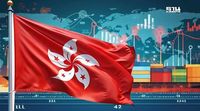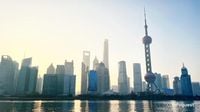In a series of bold moves, Hong Kong is positioning itself as a resilient player amid escalating tensions between the United States and China. The Chinese government has voiced strong criticisms of U.S. trade policies, particularly those affecting Hong Kong, while simultaneously announcing plans to bolster the region's economy through new financial measures.
According to a report by Investing.com, a high-ranking Chinese official overseeing Hong Kong and Macau affairs described the U.S. tax war as "shameful" and an attempt to "destroy the life of Hong Kong." The official, Xia Peilong, director of the Hong Kong and Macau Affairs Office under the State Council, argued that bullying tactics have never worked against China. "Let the American farmers cry in front of 5,000 years of Chinese civilization," Xia stated, emphasizing that pressure, threats, and blackmail are not effective ways to deal with China.
This commentary comes on the heels of U.S. Vice President JD Vance's remarks earlier this month, in which he referred to U.S.-China trade relations as dealings with "Chinese farmers," a statement that drew sharp rebuke from Beijing. The trade war has intensified recently, with President Donald Trump raising tariffs on Chinese imports to 145%, a move that was met with a retaliatory increase of 125% on U.S. goods by China.
Despite these tensions, Hong Kong's unique position as a free trade hub allows it to navigate these challenges differently than mainland China. Unlike the mainland, Hong Kong has no plans to impose retaliatory tariffs against the U.S., as stated by Chief Executive John Lee. This strategic decision aims to maintain its role as a bridge between China and the global market.
In a related development, the Chinese Ministry of Finance announced that it will issue a second set of yuan-denominated government bonds in Hong Kong on April 23, 2025. The bonds, valued at 12.5 billion yuan (approximately 1.74 billion U.S. dollars), are part of a broader strategy to enhance financial support in the special administrative region. The value of this bond issuance matches that of a previous release on February 19, 2025, and further details will be disclosed through the Central Moneymarkets Unit of the Hong Kong Monetary Authority.
Additionally, the Hong Kong Trade Development Council (HKTDC) has unveiled plans to introduce three new measures aimed at safeguarding small and medium-sized enterprises (SMEs) from the risks associated with shipping goods amid the ongoing trade war. These measures come in response to the Trump administration's imposition of a 125% tariff on Chinese imports, which has significantly impacted local businesses.
The measures include a 50% reduction in insurance premiums and an extension of coverage periods at no additional cost. They also provide risk insurance for exporters, helping to protect businesses from financial losses due to order cancellations caused by buyer issues, such as bankruptcy or contract disputes. Algernon Yau Ying-wah, Hong Kong's Secretary for Commerce and Economic Development, has engaged with local chambers of commerce and affected industries—including jewelry, textiles, food, and aluminum—to devise collaborative strategies to counter U.S. pressures.
Yau emphasized the importance of closely collaborating with the local industry to support SMEs financially, enhance their competitiveness, and explore new markets through various initiatives. Agnes Chan Sui-kuen, President of the Hong Kong Chamber of Commerce, expressed optimism regarding these measures, stating they will help bolster confidence among businesses, particularly SMEs looking to expand into emerging markets like ASEAN and the Middle East. "Hong Kong SMEs are highly adaptable and ready to seize new opportunities to reduce reliance on traditional markets," Chan noted.
As Hong Kong navigates these turbulent waters, the commitment to support its SMEs and maintain its unique status as a trading hub remains a focal point of its economic strategy. The region's ability to adapt and respond to external pressures will be crucial in determining its future trajectory in the global economy.
In summary, the interplay between U.S. trade policies and Hong Kong's economic strategies highlights the complexities of international trade relations and the importance of resilience in the face of adversity. With ongoing tensions likely to persist, the actions taken by Hong Kong's government and businesses will be closely watched by global markets.





